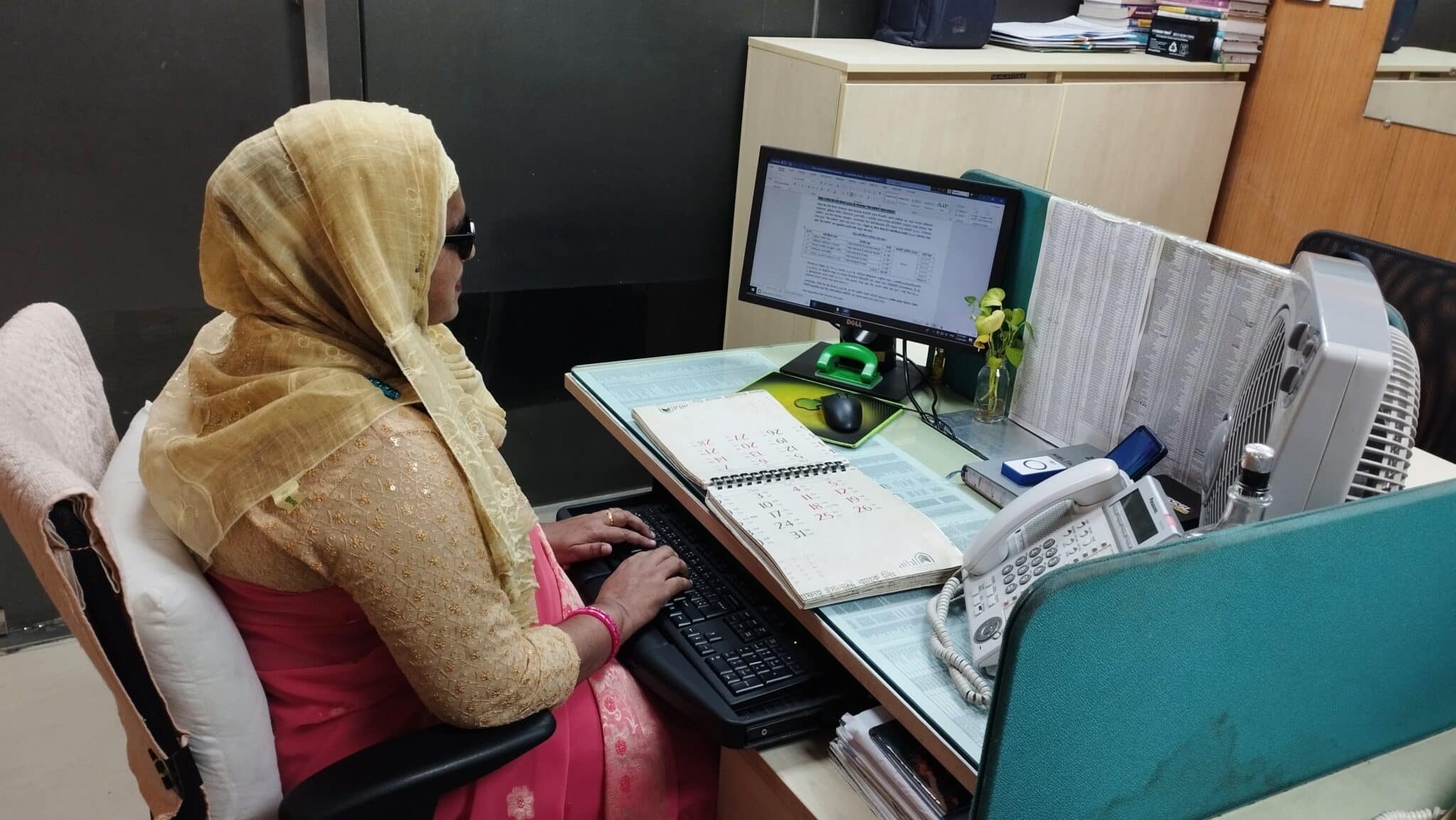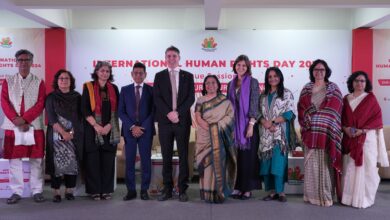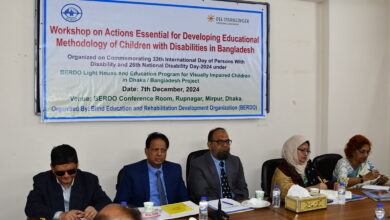Daring Journey with Disabilities of a Bangladeshi Woman
International Day of Persons with Disabilities

PARVEZ BABUL
Just close your eyes, and keep those closed for a few minutes. What happens? What did you see? Nothing at all! So now you can feel the same feelings of a visually impaired/ blind person. It’s quite a different world of darkness! No one can feel if he or she does not have an empathetic heart of fellow feelings.
World acclaimed blind, deaf American author and social reformer Helen Keller https://www.afb.org/about-afb/history/helen-keller/biography-and-chronology/biography perfectly said, “Blindness separates people from things; deafness separates people from people.”
Anyway, today December 03, 2024 is International Day of Persons with Disabilities, a UN day that is celebrated every year. The theme for this year is “Amplifying the leadership of persons with disabilities for an inclusive and sustainable future.”
World Health Organization (WHO) https://www.who.int/campaigns/international-day-of-persons-with-disabilities/2024 mentioned, the day is about promoting the rights and well-being of persons with disabilities at every level of society and development. It is to raise awareness of the situation of persons with disabilities in all aspects of political, social, economic, and cultural life. WHO joins the United Nations (UN) in observing this day each year, reinforcing the importance of securing the rights of people with disabilities. Such they can participate fully, equally and effectively in society with others, and face no barriers in all aspects of their lives.
I should point out here the central, transformative promise of the 2030 Agenda for Sustainable Development and it’s Sustainable Development Goals (SDGs) of the UN https://sdgs.un.org/goals is “Leave no one behind.” But the reality is totally opposite. Sadly, the people with disabilities are excluded and left behind from the family, society, state and all the sectors.
Even they are not included in any decision making process for the welfare of the people with disabilities locally, nationally, regionally or internationally. They are not heard by the policy makers, government or the stakeholders. So they are underrepresented and underreported intentionally due to negligence in the Media and other platforms. For the lack of necessary platform they are unable to raise their voice, logical rights and demands.
So as part of exclusion of the people with disabilities I would like to tell you a saga of a woman with visual impairment in Bangladesh. Her name is Fahima Khatun, a blind and combatant lady faced lifelong struggles. Fahima is 53 (fifty three) years old, a visually impaired, beautiful, and brilliant banker, principal officer at the Al Arafah Islami Bank, https://www.aibl.com.bd/ a private Bank in the capital city Dhaka. But her daring journey with disabilities was not smooth, rather she overcome many challenges, odds and obstacles continuously to survive, for her education and job.
In Bangladesh, the people with disabilities are ill-fated, deprived of their basic human rights. Women with disabilities are more vulnerable than the men. Even the parents feel ashamed of their children with disabilities to introduce with the neighbors, relatives and others. Because the parents doubt and think that people may look down them for their children with disabilities.
Fahima lost her eye sight due to small pox at the age of one year and seven months (Same age as globally eminent American author and social reformer Helen Keller got blindness). Smallpox is an acute contagious disease caused by the variola virus, a member of the ortho pox virus family. It was one of the most devastating diseases known to humanity and caused millions of deaths before it was eradicated. It is believed to have existed for at least 3000 years. Report of of WHO shows that globally famous musician Mozart and former president of the USA –Abraham Lincoln were infected with small pox. https://www.who.int/news-room/spotlight/history-of-vaccination/history-of-smallpox-vaccination?topicsurvey=ht7j2q)&gad_source=1&gclid=EAIaIQobChMIr7X1i7y5igMVKalmAh2qZxTBEAAYASAAEgK4YvD_BwE
So after losing Fahima’s eye sight her whole world covers with darkness! Then all the treatments were failure and her weeping started!
Her late father was a farmer and her mother, a home maker respectively. They were very shocked for Fahima’s suffering, sorrows and agony. Fahima is 53 (Fifty three) years old at present and very unfortunately she is still unmarried even at this age because of blindness! Whereas, in Bangladesh, child marriage is common; girls become the brides at the age of below 18, the legal age of marriage.
In Bangladesh, even the sighted poor women face many challenges including huge amount of dowry to offer to the grooms during their wedding.
So in that case the visually impaired poor girls like Fahima– it is apparently impossible to manage a man to marry. So, no man is interested to marry a blind girl. Because ignorance, superstitions and misconceptions are there that a blind woman will give birth of a blind child. That is why for some other wrong beliefs and misinformation men are lag behind to marry blind girls.
Though Fahima falls in love twice with two boys, but those love affairs, relationships were broke up. Her first love was with a boy, student at her college. And the second one was her University classmate.
At one stage, both of her boyfriends moved back while they thought that a blind girl can be a lover, but not a wife or life partner. In fact, no one is interested to take the responsibilities of a blind girl, as she seems to be a burden for the men. Considering those, men are reluctant to take the responsibilities of the blind girls as wives due to illogical reasons.
So there are many women like Fahima that their dreams of marriage and conjugal life did not come true for the same reasons. That is why they commented with great regret that life is not a bed of roses especially for the blind women and the women with disabilities as well. Even its a matter of great regret that some husbands had divorced their wives blaming them due to so-called fault of giving birth of children with disabilities! Though the wives are not responsible to give birth of children with disabilities, daughter or son. So the negative mindsets and ignorance of some men must be changed.
There are some other familial and societal misbelief in Bangladesh that the girls will go to their husband’s house only to cook foods; so no need to educate them. Which is why, some of Fahima’s family members and relatives discussed and decided not to send her to school for study. But her elder brother thought that it was better to send her school rather than sitting idle at home.
So Fahima started going to a nearby primary school. She had learnt Braille language that was invented by Louis Braille, a French blind man, the medium of blind people’s education. She was a very talented student, so the teachers and classmates inspired her to continue studies.
The hostels/ dormitories are not safe, favorable and comfortable at the schools and colleges for the blind students in Bangladesh. But yet overcoming all the odds, social stigma, poverty, disadvantage, Fahima continued her study up to the higher level. She successfully completed her Masters’ Degree in political science at the Dhaka University https://polisci.du.ac.bd/ in 1995.
After that she accomplished another special degree, Bachelor of Special Education (BSED) with her own interest and initiatives in 2004. In the meantime she already joined Bangladesh Blind Mission, https://bangladeshblindmission.wordpress.com/ a national voluntary organization. She worked there a few years at the Inclusive Education for the Blind project. After that she worked at the Bangladesh Protibondhi Foundation https://www.bpfbd.org/ for the welfare of the people with additional disabilities of visually impaired.
At present Fahima works at Al Arafah Islami Bank, a private bank in Bangladesh. She operates a Desktop computer at her office using the NVDA (Non-Visual Desktop Access). It allows blind and vision impaired people to access and interact with the Windows operating system and many third party applications.
Mr. Saidul Huq, another visually impaired person, philanthropist, founder of the Blind Education and Rehabilitation Development Organization (BERDO), https://www.berdo-bd.org/ a nonprofit, non-governmental organization in Bangladesh helped Fahima getting the job at the bank.
Saidul motivated the bank authority that the visually impaired people and people with disabilities are differently able. And they must get the opportunity in the job sector to unlock their potential. So the bank authority appointed Fahima accordingly. And they are satisfied with her job performance as the Principal Officr at the bank. Her colleagues and customers of the bank are supportive and cooperative with her. Some customers sometimes mistreat with her for their ignorance. Though it is painful but yet Fahima takes that easy and blamed her bad luck to be blind.
While contacted, Saidul Huq said, “Fahima is very intelligent, sincere, energetic, dynamic and hardworking person. She is a skilled and strategic communicator. So I took the opportunity to request the chairman of the Al Arafah Islami Bank, and collected Fahima’s appointment letter hand to hand instantly. It was the generosity of the chairman, he kept my request.”
“I always try and contact different offices for the employment of the visually impaired and the people with disabilities as well. So to ensure the dignified lives and suitable employment for them I have been working for more than three decades for the welfare of people with disabilities. I have established / founded a national level voluntary nonprofit organization: BERDO in Bangladesh. And I have been fighting since its inception with my very limited resources,” Saidul added.
As a change maker and catalyst, what do you want to recommend for making a change in the gloomy sector of disabilities in Bangladesh?
“People’s negative mindset must be changed through making awareness about the human rights of the people with disabilities. More success stories and achievements of the people with disabilities in different sectors need to focus through the Media, public and private events and platforms. Print, electronic and social Media should cover the disability issues with greater emphasize so that the policy makers and all the stakeholders take comprehensive approaches for the long term benefits,” Saidul recommended.
In Bangladesh, social stigma exists and population with disabilities is on the rise. According to the survey of Bangladesh Bureau of Statistics 2022, visual impairment has the larger prevalence than any other kind. Among the persons with disabilities percentage share of different types of impairments are hearing 18.6 percent, visual 32.2 percent, speech 3.9 percent, physical 27.8 percent, intellectual 6.7 percent and multiple 10.7 percent.
Urban people are less likely to suffer from disabilities with a prevalence of 23.2 than the rural people with a prevalence of 26.2 per 1000 population. Individuals from the poorest socioeconomic backgrounds are more likely to have disabilities, with a prevalence of 34.4 per thousand, compared to those from the richest backgrounds, who have a lower prevalence rate of 21.7 per thousand.
Ayon Debnath, a campaign adviser of the Sight Savers, https://www.sightsavers.org/ said that persons with disabilities are unable to shine in Bangladesh because public health facilities dedicated to them are badly inadequate and their access to education and jobs are very limited.
Regarding disabilities in mental healthmany women said that they seriously considered attempting death by suicide. Suicide prevention can take the form of mental health education, which is highly recommended by the experts. Mental health should be taught as a part of the curriculum in schools and colleges as a part of the health class. Students need to know signs of depression and mental health awareness especially before they get disabilities, experts observed.
In the Constitution of Bangladesh, article 15, 17, 20 and 29 upholds the same rights and dimensions for the persons with disabilities with other citizens.
The Rights and Protection of Persons with Disabilities Act, 2013 https://legislativediv.portal.gov.bd/sites/default/files/files/legislativediv.portal.gov.bd/page/64379df1_f98c_47ff_b9e6_cbcabadd8ece/26.The%20Rights%20and%20Protection%20of%20Persons%20with%20Disabilities%20Act%2C%202013.pdf of Bangladesh mentioned some of the Rights of persons with disabilities. For example, (a) right to survive and develop to the fullest; (b) equal recognition before the law and access to justice in all cases; (c) right of inheritance; (d) freedom of expression, opinion and access to information; (e) right to live with parents, lawful or legal guardians, children or families in a society, to establish marital relations and to form family;
(f) accessibility; (g) full and effective participation in social, economic and state affairs, according to the type of disability, among others. But those remain only in the papers and lip service; are hardly implemented, the experts opined.
Fahima earns money through her monthly salary from her office. She has built a house at her village through saving the money for her brother and sisters. And she pays the monthly installments of bank loan that she took to build the house. In addition, she regularly gives money to the family members for food and other requirements.
Regrettably she is seemingly alone in her life. It’s truly a tragic as human being! Like Fahima, most of the blind women are deprived of many constitutional human rights. Many of their dreams are yet to come true.
There are many visually impaired women and girls in Bangladesh like Fahima that they are treated as the over burden in the family and society. So lamentably, unexpectedly and illogically they are isolated and pass the timeframe of their lives as many years in solitude. They are deprived from their proper treatment, education, even the basic demands of their lives. During floods and disasters they suffer the most. Climate change, Covid-19 pandemic, food and nutrition insecurity and other sickness witness their lives worst wreaking havoc.
Once I asked Fahima who was her inspiration behind the daring journey in her life? She said, “I am very glad to mention that she was definitely greatest woman Helen Keller inspired me a lot in many ways. I have gone through the biography of Helen Keller and accepted her as my ideology, philosophy, guide and lifelong mentor. And I took some training about inclusive education for the blind at Helen Keller International –Bangladesh. https://helenkellerintl.org/ So, for many reasons Helen Keller must be the inspiration for all the people with disabilities.”
“I always recall some quotes of Helen Keller and testimonials about her. For example, as Jimmy Carter former president of USA and Nobel Peace Prize Winner of 2002, wrote, “Helen Keller was a woman of modesty, because despite her remarkable accomplishment she did not view herself as remarkable…Without sight, she saw clearly in to the souls of her fellow men and women and without hearing she heard plainly the cries of people who suffered from poverty, from war, from disabilities, from discrimination… and other suitable words that the globally eminent persons remarked about her,” Fahima narrated.
“Louis Braille https://en.wikipedia.org/wiki/Louis_Braille also inspired me very deeply. Because I become wonder when I thought that how a blind person like him invented the Braille language for us to read and write. So considering the spirit, outstanding and remarkable contributions of both Helen Keller and Louis Braille I have founded a nonprofit voluntary organization, named: “Real View”. The full form of her Real View is: Rehabilitation through education, accommodation, livelihood for visually impaired women. It serves as a guide to increase the mobility through ensuring the rights of visually impaired women and girls.
I have been working for the welfare of the blind through my own organization in Bangladesh. And I feel happy through offering help the helpless, most vulnerable, disadvantaged children in our country. I have been working for those children to survive, educated and live life properly with dignity. It needs lot of money to implement the projects. So the financial and technical assistance from the government and donor agencies are essential,” Fahima urged.
It was a sunny holiday afternoon when I took this interview of Fahima sitting on a cemented bench at a lake-side park in Dhaka city. The surrounding poetic view attracts our minds and hearts. Fahima loves poetry of different poets at home and abroad in Bangla and English.
Upon my request Fahima recited a poem: “Paradise Lost” https://www.poetryfoundation.org/poems/45718/paradise-lost-book-1-1674-version of the globally renowned, eminent poet John Milton. John too lost his eye sight and became immortal with his aesthetic and impeccable poems. So, with undivided attention and melodious voice Fahima amazingly recited the Paradise Lost:
“OF MAN’S first disobedience, and the fruit,
Of that forbidden tree whose mortal taste
Brought death into the World, and all our woe,
With loss of Eden, till one greater Man
Restore us, and regain the blissful Seat…”
About the author: Parvez Babul is an award-winning journalist, poet, author, story teller and activist based in Bangladesh. He is a Feminist Foreign Policy Fellow of IMPRI and Asia Foundation. As part of the Fellowship he writes about the human rights of women, and the women with disabilities. Email: parvezbabul@gmail.com





